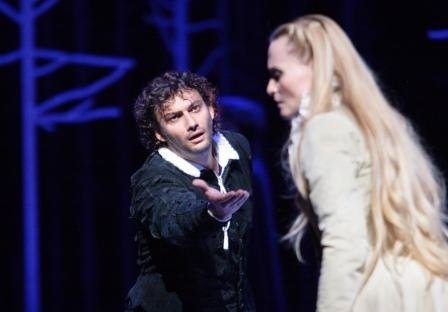|
|
|
|
|
|
|
|
| What's on Stage, 16 September
2009 |
| Simon Thomas |
|
|
Don Carlo
|
| Photo: Catherine Ashmore |
 Nicholas
Hytner’s production of the five act Italian version of Verdi’s Don Carlo was
new last June and, strange as it may sound, hasn’t aged well. There’s a
blandness and perfunctoriness about the staging and direction that resembles
an umpteenth revival in the hands of a much less-inspired director. Nicholas
Hytner’s production of the five act Italian version of Verdi’s Don Carlo was
new last June and, strange as it may sound, hasn’t aged well. There’s a
blandness and perfunctoriness about the staging and direction that resembles
an umpteenth revival in the hands of a much less-inspired director.
The cast is a mix of returning and new artists. Marina Poplavskaya’s
Elisabetta has grown in the intervening time and Ferruccio Furlanetto’s King
Philip is as strong as ever. Replacing Rolando Villazón as Carlo, Jonas
Kaufmann swaps manic, boyish bewilderment for an ardent sensitivity, with
some thrilling high points. There’s not a lot going on between this
Carlo and Simon Keenlyside’s low-key Posa, though, with the latter only
coming to life, ironically, during his death scene.
New also are John Tomlinson, singing his first Grand Inquisitor in the
house, and American mezzo Marianne Cornetti, a late replacement as Eboli.
Tomlinson is as reliable as we’d expect, his big scene with the king a
fascinating sparring between veterans.
Cornetti is a formidable love-rival, enough to send Carlo sprawling on her
first entrance. It is a matronly interpretation, with a matching plumminess
and vibrato, better suited to Trovatore’s Azucena or Ulrica from Ballo.
Eboli revealing herself to Carlo in the garden scene raised a huge and
widespread laugh from the audience on the first night, not the reaction one
expects. There is unintentional comedy elsewhere – Kaufmann makes a strange
lunge for Elisabeth in an early scene and all but double-takes when he meets
her at the tomb for the final encounter – small flaws that Hytner really
should have ironed out.
Semyon Bychkov conducts an emotionally-distant account of the score, lacking
the Italianate heat and nuance of Antonio Pappano’s last year. After a
magnificent Lohengrin earlier in the year, it’s something of a
disappointment. Tempi are all over the place with some sections whizzing
along and others dragging terribly slowly. The Veil Song lacks any sparkle.
How much you enjoy the performance will depend on your feelings about
individual singers and your response to Bychkov’s precise but passionless
conducting. Any enjoyment derived is likely to be in spite of Bob Crowley’s
sparse and ugly designs, with the auto-da-fe scene in particular (garish
gold church façade and plastic burning bodies) poised uncomfortably between
realism and stylisation. |
|
|
|
|
|
|
|
|
|
|
|
|
|
|
|
|
|
|